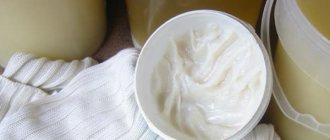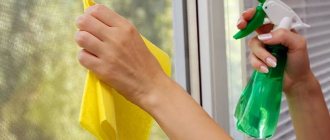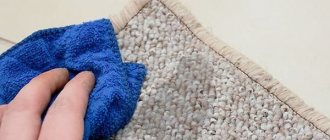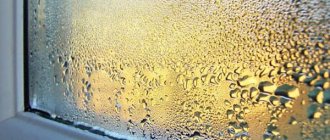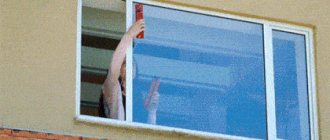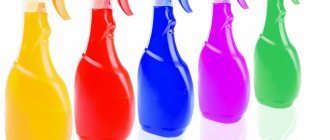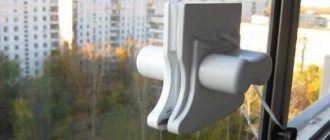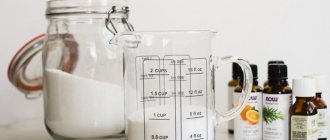Until modern drugs appeared, women managed to wash windows so that they shone. The funds that were always at hand were used. Housewives knew when to do work. If you apply any composition to glass when the sun's rays fall on it, it dries quickly, but marks appear on the surface. Even when using the simplest homemade window cleaner in cloudy, windless weather, no streaks remain. The glass will be cleaned and begin to shine in the same way as when using chemical compounds.
Store funds
Nowadays, stores are full of all kinds of window cleaning products, and they are all expensive.
Their price is understandable: production costs, wages to workers, promotion of goods, and other expenses need to be recouped, and even gain a little money so that the owner of the “brand” can buy himself a small island in the Mediterranean Sea. The buyer's pocket suffers from this. Most often, solid particles (dust, grains of sand) and greasy particles (fingerprints, insect marks, greasy deposits from the stove) collect on the windows. Only a high-quality window cleaner can deal with all these contaminants.
The composition of purchased products usually includes: water (universal solvent), ethyl alcohol, surfactants (surfactants).
- Alcohol dissolves everything that water could not dissolve. In addition, it increases the penetrating properties of the liquid, helps it absorb into the cloth and is easily removed without leaving streaks.
- Surfactants provide the cleaning power of all store-bought products. They effectively remove both hard and fatty particles.
- Some products may contain ammonia for better grease removal.
So, we all know in practice that store-bought products are quite effective. And they are sold in special plastic containers with a dispenser, which are very convenient to use. However, they are too expensive and often cause allergies.
Benefits of homemade cleaning mixtures
By making your own detergent, you can be sure of its absolute safety, since you know exactly all the components. While modern household chemicals are simply replete with various additives, have a very strong chemical smell and are unsafe for children.
An undoubted advantage of the home remedy is its low cost. This way you can save significantly on the purchase of household chemicals, since the prices for them in stores are very high and leave much to be desired.
An environmentally friendly detergent is especially important for people prone to allergic reactions and families with small children. And also such a need arises in a situation when, during general cleaning, the detergent suddenly runs out, and there is simply no time to be distracted to go to the store.
Homemade Window Cleaning Recipes
An effective window cleaner can be made from substances available to any housewife.
Homemade cleaning solutions often include the following ingredients:
- lemon;
- alcohol;
- soap;
- starch;
- ammonia;
- vinegar;
- soda;
- glycerol;
If it is necessary to remove severe contamination, add potassium permanganate, ammonia and ash.
To wipe mirrors, it is recommended to use a cloth made of soft materials. This will help avoid streaks.
Water and lemon
You can replace household chemicals with a simple product that not only removes dirt and old stains, does not form residue, but leaves a pleasant smell in the room. To prepare the aromatic liquid:
- The lemon is peeled.
- The peeled skin is placed in a liter jar.
- Pour in vinegar.
- The container is sealed with a lid.
- After a week, the composition is filtered.
Before washing windows, the product that cleans and disinfects glass is slightly diluted. If there is no time to prepare such a composition, simply squeeze the juice out of the fruit and mix it with a glass of water. Citric acid copes with contamination; 3 teaspoons of powder are dissolved in 250 ml of cooled boiling water.
Starch
There are no traces or dirt left on the glass if you use one of the old folk recipes. Previously, housewives themselves made starch from potato tubers. Now this product is sold in every store. To wash the window, 1 tbsp. A spoonful of powder is combined with 4 glasses of water and sprayed with a spray bottle. The composition is wiped with a sponge and then with a dry cloth.
Vinegar
To clean glass from old stubborn dirt, greasy stains, dust, bird droppings, and fly marks, pour a glass of water into a spray bottle, add a little dish gel and a spoonful of table vinegar. The product is applied to the surface of the windows, removed with a sponge, and the glass is wiped with a dry cloth. If this composition does not cope with pollution, it is worth remembering another folk recipe.
Vinegar, alcohol and starch
An effective product that can be used to clean windows without streaks is prepared from alcohol, vinegar and starch.
For this:
- 1. Pour 400 ml of water at room temperature into a container.
- 2. Add a tablespoon of starch there.
- 3. Mix thoroughly until the powder is completely dissolved.
- 4. Pour 50 ml of vinegar into the liquid.
- 5. Add the same amount of alcohol.
- 6. Shake the composition intensively.
Using this liquid, you can get rid of the most stubborn stains, and the glass will shine after washing.
Black tea and vinegar
Some women do not accept modern chemicals, but prefer simple home remedies that clean both mirrors and glass. A rag is soaked in a liquid consisting of 200 ml of brewed black tea and 60 ml of table vinegar, and the window is wiped. After this, take clean water and wash off the applied solution, dry it with a newspaper or napkin.
Ammonia
Ammonia is toxic; it is recommended to work with it especially carefully.
The process of preparing the solution:
- Pour a liter of heated water into a glass container.
- Add 1 tbsp. l. ammonia.
- Use the resulting liquid to wipe the window with a microfiber cloth.
It is recommended to wipe the glass with newspapers: printing inks contain carbon. By interacting with ammonia, it allows you to give the glass a special shine.
Liquid soap and vinegar
Regular chalk can remove dirt; when mixed with water, it produces a paste that can be used to clean dishes and windows. The composition is applied to the surface, wiped off when it dries and turns into plaque. A foaming solution, which is obtained by pouring 40 ml of vinegar and a little liquid soap into a glass of water, perfectly removes stains from glass. Plastic products quickly get dirty; to remove dirt and grease from the windowsill, pour in washing powder and wipe the surface with a sponge, starting with the largest stains.
Vinegar and soda
Abrasive materials clean products very well, remove oil and grease, and inscriptions written with a felt-tip pen, but damage the surface. To avoid scratches on the glass, but to get rid of dirt, the windows are washed with a solution, for the preparation of which 1/4 cup of vinegar and 20–30 g of baking soda must be diluted in a liter of water.
To make the glass shine, sodium carbonate is replaced with the same amount of salt.
Chalk solution
For very dirty windows, a composition based on finely ground chalk will help. If the windows have not been washed for a long time, there are streaks and traces of insects, then the chalk is diluted with water to a paste, and in this water is spread over the glass surface.
2Useful tips
A homemade glycerin-based polish will help protect glass from dust and dirt. Combine 30 ml of water with 70 g of glycerin and a few drops of ammonia. To leave a pleasant aroma in the room after using it, you can add a couple of drops of your favorite essential oil.
To avoid having to deal with heavy stains, it is recommended to regularly wipe windows with a weak saline solution.
Home-made products are not inferior in effectiveness to store-bought ones, but they have a safe composition and are much cheaper.
Other popular windshield wipers
In addition to the car glass cleaning products presented in the previous section, there are currently also a large number of their analogues on the market. Their effectiveness varies and depends on the composition, price, as well as the logistics component, that is, in some regions of the country a particular product may or may not be available for sale. Thus, the following glass cleaners are popular among domestic car enthusiasts:
- AREXONS Scheiben Schaum;
- ARMOR ALL Glass Cleaner;
- ARMOR ALL Auto Glass Cleaner;
- BBF glass cleaner;
- CARAMBA Glas-Reiniger;
- CARAMBA Glasreininger-Schaum;
- CRC Glass Clean;
- GUNK Green Concentrated Cleaner;
- GUNK Glass Cleaner with Ammonia;
- KANGAROO Fine Glass;
- KERRY KR-920, foam glass cleaner;
- KERRY KR-520, glass cleaner;
- LONG WAY Glass Cleaner;
- RAVENOL Glasklar;
- REX Scheiben-Klar;
- PINGO BIO-GLASREIN MIT BIO-ALKOHOL;
- RUNWAY GLASS CLEANER;
- SHELL Window Cleaner;
- SONAX Scheiben Schaum;
- SOFT99 Glaco Glass;
- SONAX Xtreme NanoPro Scheiben Klar;
- STEP UP Glass & Plastic Cleaner Film Remover;
- WILLSON cleaner-polish with diamond chips;
- WURTH active glass cleaner.
Naturally, this list can go on and on. But the assortment on store shelves depends, among other things, on the logistics component. Therefore, in some regions of the country, this or that product may not be available for sale precisely for this reason.
Folk home remedies for cleaning windows
The most popular folk remedies include vinegar, ordinary laundry soap and lemon. Soapy water (laundry soap solution) is a cheap and effective remedy. Soap is just a surfactant that perfectly removes dirt on windows. But with it, washing turns into a very lengthy process. First you need to wash the glass with soapy water, then rinse it several times with clean water, then wipe it dry and, at the last stage, polish it with newspaper. The windows, of course, will sparkle, but this will take a lot of time.
Vinegar and lemon do not contain any active ingredients such as alcohol or surfactants. They contain acids (acetic and citric, respectively), but they do not cope with dust or grease. Therefore, adding vinegar or lemon juice to water does not bring any positive results.
For slightly dirty glass, as well as dust from furniture, it is better to use a microfiber cloth soaked in water with the addition of EM preparations. After cleaning, you can water your indoor plants with the same water.
With lemon juice
Lemon juice is often used to clean double glazed windows. Its advantage is its light citrus aroma. The effect is achieved through the action of acid on pollution.
To prepare the product, mix 250 milliliters of warm water with a quarter glass of lemon juice.
Using a spray, the prepared liquid is distributed over the glass. After this, the surface of the glass is wiped dry with a dry cloth. For severe contamination, first use a soap solution to remove the main dirt.
Homemade glass cleaners
- Vinegar water. Add 9% table vinegar to clean water at the rate of a couple of tablespoons for every liter of liquid.
- Ammonia with starch. For 100 ml of pharmaceutical ammonia, take the same amount of vinegar, 4 liters of clean water and 30 mg of potato starch. If you want, you can add a little blue.
- Ordinary ammonia. A solution is made at the rate of 15 mg of ammonia per 1 liter of water.
- Soap solution. Used for washing frames. The grated bar of soap is stirred until completely dissolved with warm water.
- Starch. A tablespoon of starch is added per liter of water.
- Manganese. Dilute several crystals in water until light pink. Do not allow it to get on the frames.
- Chalk. Mix a glass of water with three tablespoons of powdered chalk. Apply this paste to the glass and leave for a while. Then wipe with a dry cloth.
Stubborn greasy drops are easily dissolved with dishwashing detergent. A 1 to 10 mixture of glycerin and alcohol will prevent condensation from depositing on the windows during the cold season.
A weak solution of table salt will prevent icing of windows. However, it is worth considering the ability of salt crystals to accumulate moisture.
Helpful advice! For particularly dirty windows, household chemicals may be required. When choosing a detergent, you need to pay attention to what type of frame it is suitable for. Can it be used on wooden or plastic surfaces, does it destroy the varnish coating, etc.
It happens that you need to tidy up the apartment you bought, where, it seems, you have never dealt with grease and dirt. In this case, you can turn to car glass and mirror cleaners.
They work great in road conditions and can help out in emergency situations. The main thing is to stock up on a good mood for the whole day, and any dirt will be defeated.
Necessary tools and tools
In autumn and spring, many housewives traditionally do general cleaning, which includes washing windows.
It would seem that the question “how to wash windows” has long lost its relevance, because there are so many effective and affordable products in stores.
However, quite often you can hear calls to abandon the almighty household chemicals in favor of more environmentally friendly home remedies.
Soap and vinegar
If you want to wash a window with a lot of foam, as in any advertisement on TV or in pictures, then the cleaning composition for this will look like this:
- pour a glass of water into the container;
- add two tablespoons of vinegar;
- pour in half a teaspoon of liquid soap;
- Whisk the resulting liquid thoroughly, it’s time to start washing the windows.
If more detergent is needed, use more in the same proportions.
What can't be used?
In an effort to clean faster and more efficiently, you can easily damage your windows. To prevent this from happening, it is important to remember some prohibitions:
- You should not mix different components in a row, trying to make the composition more saturated. Some substances cannot be combined together, as they either neutralize each other's effects, or, conversely, can cause the washing solution to become too caustic. In the latter case, the seals and the plastic itself may suffer.
- You should not try to speed up the window cleaning process by using abrasive brushes and coarse-grained compounds, for example, coarse salt, etc. The sharp edges of the grains and a hard brush can easily scratch both the glass itself and the frame.
- In order for the glass to remain streak-free, the final stage of care should be polishing and necessarily wiping the surface dry.
- Components to which family members are allergic should not be used as ingredients in the cleaning solution.
Why do windows sweat?
There are a number of reasons for the formation of condensation on plastic windows. Moreover, this problem does not always appear immediately after installing a new double-glazed window. It happens that the renovation was completed long ago, the window structure held the heat well for two or three years, and suddenly the glass began to become covered with moisture. What is the reason for such trouble?
- Poor air circulation in an apartment is the most common cause of condensation on glass. If forced ventilation is not installed in the kitchen, and the area of the room is small and something is constantly being cooked and fried on the stove, fogging of the windows in the house cannot be avoided. The situation will be aggravated by laundry hanging out to dry and a lot of indoor plants, which increase the already high humidity in the room. Streams of warm air collide with cold glass and leave wet marks.
- It's cold inside. Often, residents experience window fogging in the wet, cold autumn, when the heating in the apartment is not yet turned on, and there is slush and bad weather outside the window. Also, a similar problem can arise due to insufficient heating or improper installation of window sills. If the window sill prevents the passage of warm air from the radiator to the double-glazed window or the window is covered with thick curtains, then wet drops will certainly appear on the glass, and ice will appear on the profile.
- Incorrect glass unit selected. Double-glazed windows with more than two chambers are suitable for glazing residential premises. Inexpensive two-chamber packages are not able to properly retain heat in the apartment.
- Poor quality fittings. Plastic windows can sweat due to loose fitting of the sashes to the frame and lack of necessary insulation.
- Defects made by workers during installation of the structure. If a plastic window is installed poorly, cracks and gaps may remain between the wall of the window opening and the frame, where cold air from the street will enter. This will lead to fogging of the glass, and the problem will appear in the first winter after installing the window.
- Unadjusted fittings and worn rubber seals can also cause condensation to form on the windows. Frosty air from the street will penetrate into the cracks and holes of the seal, resulting in the formation of ice and condensation on the window.
To prevent the plastic window from sweating and the glass to remain clean and transparent, it is necessary to carry out timely maintenance of the PVC structure: lubricate and tighten the fittings, take care of the seal, and remove moisture accumulated between the chambers.
How to wash windows on a balcony outside on a high floor
It is especially difficult to take care of the cleanliness of balcony windows, because they are more difficult to reach, and they are larger in area. It is important to find the right tools, the right tools and do everything according to the rules.
The procedure depends on the design of the glazing of the balcony or loggia. It is most convenient to wash collapsible windows, when the sashes can be removed from the guides and safely processed from different sides.
How to clean non-removable windows
Let's consider how to wash windows on a balcony from the outside if they cannot be disassembled, but open or slide apart. First, you need to deal with the adhering dust by walking over the glass and frames with a damp cloth. Then rinse it well or use a new one, and, after moistening it in the cleaning solution, thoroughly wash first the profiles, then the glass. Next, rinse off the foam and wipe the glass dry.
You will have to use a device on the handle, equipped with foam rubber and a rubber water outlet. The foam nozzle is wetted in the solution, and glass and plastic are wiped with it.
The next stage is washing the glass from the side of the apartment. A long mop with a foam attachment will also help here, but you can use a regular rag.
Folding windows on the balcony or loggia
Washing windows on a loggia or balcony is simplified with dismountable windows. They are removed from the guides by bending the plug, lifting the flaps and pulling them towards you. It's better if a man does this. After finishing washing the frames and glass, do not forget to clean the rails on which the frames move. When you return the glass packages to their place, make sure that there are no fingerprints left on them.
Cleaning windows without streaks is possible if you use alcohol or ammonia. Dish degreaser will also do a good job when cleaning glass. Balcony windows are often contaminated with bird droppings. We'll have to deal with this first.
On the balcony and loggia, you can safely use industrial window cleaning liquids, because ventilation occurs faster. If after using them the glass becomes matte, wipe it with vinegar to make it shine.
The glass in the apartment and on the balcony will remain clean longer if, after washing, rub it with diluted glycerin.
Keeping windows clean is not as difficult as it seems at first glance. With the right technique and well-chosen products, cleaning will not take much time, and you can be proud of the result of the work.

